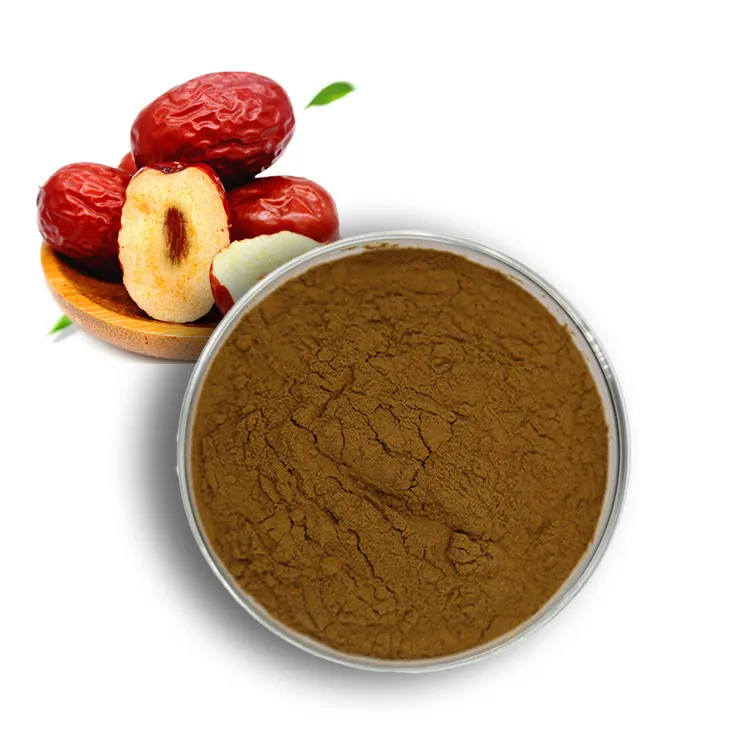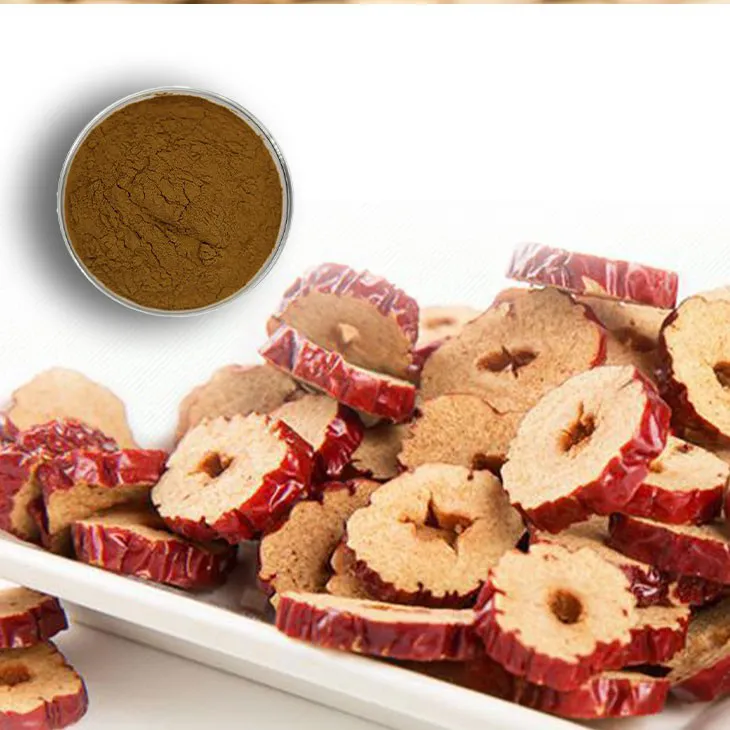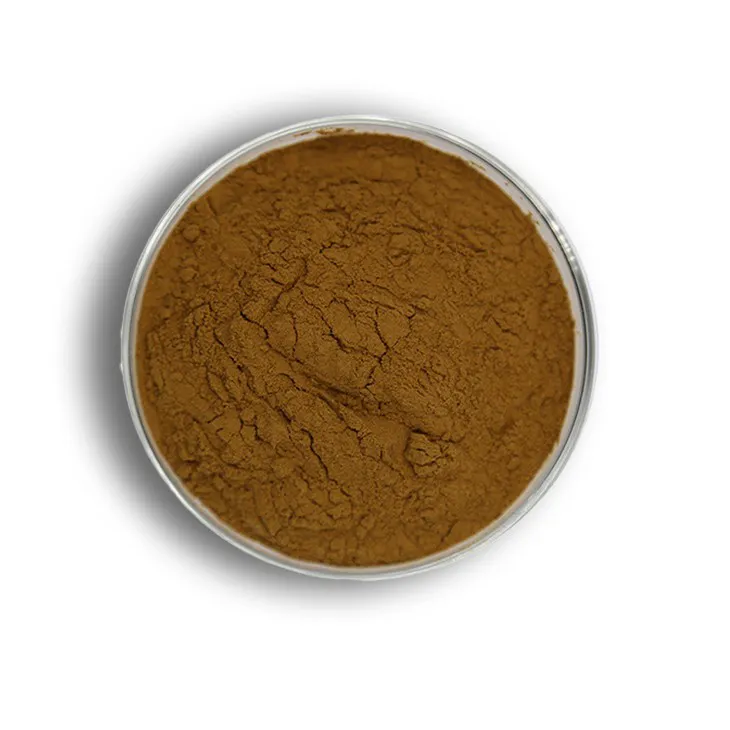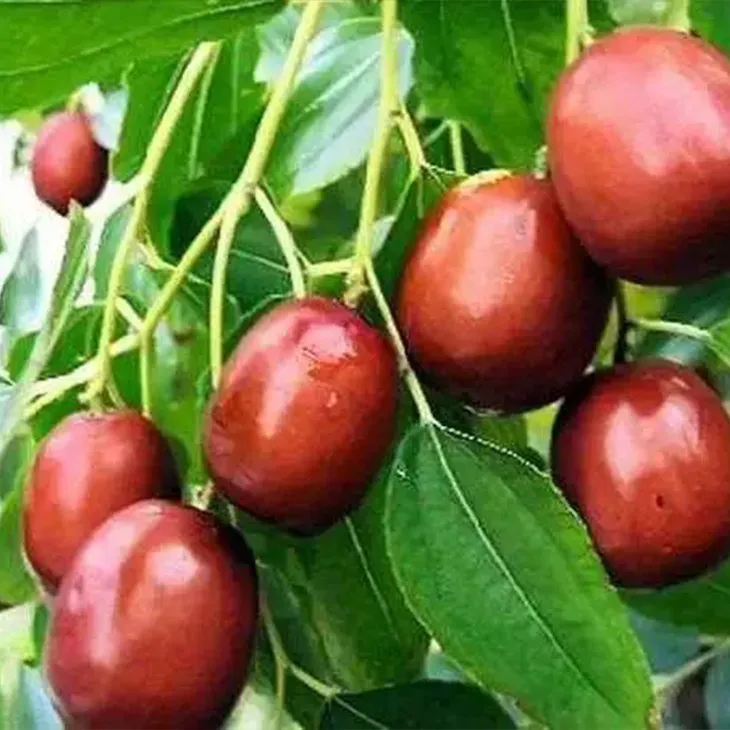- 0086-571-85302990
- sales@greenskybio.com
Components of Jujube Extract in Fertilizers and Feeds.
2024-11-30

1. Introduction
Red Date Extract has emerged as a valuable component in both fertilizers and feeds. Jujube, also known as Chinese date, has been cultivated for centuries in many parts of the world, especially in Asia. The extract obtained from jujubes contains a rich variety of nutrients and bioactive compounds, which can bring numerous benefits to plants in fertilizers and livestock in feeds.

2. Components of Jujube Extract
2.1 Carbohydrates
Jujube Extract is rich in carbohydrates, including sugars such as glucose, fructose, and sucrose. These carbohydrates play a crucial role in both fertilizers and feeds. In fertilizers, they can serve as an energy source for soil microorganisms. When added to the soil, the carbohydrates in Jujube Extract are decomposed by soil bacteria and fungi. This decomposition process releases energy, which in turn stimulates the growth and activity of these microorganisms. As a result, the soil structure is improved, and nutrient cycling is enhanced. In feeds, carbohydrates are a major source of energy for livestock and poultry. The simple sugars present in jujube extract are easily digested and absorbed by animals, providing them with the necessary energy for growth, reproduction, and normal physiological functions.
2.2 Vitamins
Jujube extract contains a variety of vitamins, such as vitamin C, vitamin B complex (including thiamine, riboflavin, niacin, etc.), and vitamin E. In fertilizers, vitamins can have a positive impact on plant health. For example, vitamin C is an antioxidant that can help plants resist oxidative stress caused by environmental factors such as pollution and extreme weather conditions. In feeds, vitamins are essential for the proper growth and development of livestock and poultry. Vitamin C can enhance the immune system of animals, making them more resistant to diseases. Vitamin E is also an antioxidant that can protect the cells of animals from damage, improve the quality of meat and eggs, and enhance the reproductive performance of livestock.
2.3 Minerals
Jujube extract is a good source of minerals. It contains potassium, calcium, magnesium, iron, zinc, and other minerals. In fertilizers, these minerals can directly supply essential nutrients to plants. Potassium is important for plant growth and development, as it is involved in processes such as photosynthesis, water regulation, and disease resistance. Calcium is crucial for cell wall formation and stability in plants. In feeds, minerals are necessary for maintaining the normal physiological functions of livestock and poultry. Calcium is essential for bone development in animals, while iron is important for oxygen transport in the blood. Zinc is involved in many enzymatic reactions in animals and is necessary for proper growth and reproduction.
2.4 Amino Acids
Jujube extract contains a certain amount of amino acids, which are the building blocks of proteins. In fertilizers, amino acids can be absorbed directly by plants or can be used by soil microorganisms to produce other beneficial substances. Some amino acids, such as glutamic acid and aspartic acid, can act as chelating agents, helping plants to absorb minerals more effectively. In feeds, amino acids are crucial for the growth and development of livestock and poultry. They are used to build muscle, produce enzymes and hormones, and maintain the normal structure and function of tissues and organs.
2.5 Bioactive Compounds
Jujube extract also contains bioactive compounds such as flavonoids, phenolic acids, and triterpenoids. In fertilizers, these bioactive compounds can have various effects on plants. Flavonoids, for example, can improve plant resistance to pests and diseases, enhance photosynthetic efficiency, and regulate plant growth and development. In feeds, bioactive compounds can have beneficial effects on livestock and poultry. Flavonoids can improve the antioxidant capacity of animals, reduce inflammation, and enhance the quality of meat and milk.

3. Functions in Fertilizers
3.1 Enhancing Soil Fertility
As mentioned earlier, the components of jujube extract can enhance soil fertility in multiple ways. The carbohydrates and amino acids in the extract can stimulate the growth and activity of soil microorganisms. These microorganisms play a vital role in decomposing organic matter, releasing nutrients, and improving soil structure. The minerals in jujube extract can directly supplement the nutrient content of the soil. For example, potassium can improve soil fertility and plant growth, while calcium can enhance soil aggregation and water - holding capacity.
Moreover, the bioactive compounds in jujube extract can also have a positive impact on soil fertility. Flavonoids and phenolic acids can interact with soil particles, affecting the adsorption and desorption of nutrients. This can help to maintain a stable supply of nutrients in the soil and prevent nutrient leaching.
3.2 Promoting Plant Growth
The nutrients and bioactive compounds in jujube extract are beneficial for plant growth. Vitamins such as vitamin C can protect plants from oxidative stress, allowing them to grow better under adverse environmental conditions. The amino acids can be directly absorbed by plants and used for protein synthesis, which is essential for plant growth and development.
The minerals in jujube extract are also crucial for plant growth. Potassium can enhance photosynthesis, improve water use efficiency, and increase plant resistance to diseases and pests. Calcium can strengthen cell walls, making plants more resistant to mechanical damage and pathogen invasion.
Bioactive compounds like flavonoids can regulate plant hormones, influencing processes such as root growth, shoot elongation, and flowering. This can ultimately lead to improved plant growth and higher yields.

4. Functions in Feeds
4.1 Improving Nutrition
Jujube extract can significantly improve the nutrition of livestock and poultry feeds. The carbohydrates, amino acids, vitamins, and minerals in the extract can supplement the nutrients lacking in traditional feeds. For example, the presence of vitamin C can meet the increased antioxidant needs of animals, especially during periods of stress or disease. The amino acids can provide additional building blocks for muscle growth and protein synthesis in animals.
The minerals in jujube extract, such as calcium and iron, are essential for the proper development of bones, blood, and other physiological functions in animals. By adding jujube extract to feeds, the overall nutritional value of the feed can be enhanced, leading to better growth, development, and productivity of livestock and poultry.
4.2 Increasing Resistance
The bioactive compounds and vitamins in jujube extract can increase the resistance of livestock and poultry to diseases. Vitamin C and E are antioxidants that can protect the cells of animals from oxidative damage caused by free radicals. This can strengthen the immune system of animals, making them more resistant to infections and diseases.
The bioactive compounds such as flavonoids can also have anti - inflammatory properties. They can reduce inflammation in animals, which is often associated with various diseases and stress conditions. By reducing inflammation, animals can maintain better health and performance.

5. Potential Applications
5.1 In Organic Farming
Jujube extract has great potential in organic farming. In organic fertilizers, it can be used as a natural and sustainable source of nutrients. Since it is derived from a plant source, it is more acceptable in organic farming systems compared to synthetic fertilizers. It can help to improve soil fertility, promote plant growth, and enhance the resistance of plants to pests and diseases without the use of chemical pesticides and fertilizers.
Moreover, in organic livestock farming, jujube extract can be added to feeds to improve the nutrition and health of animals. This can lead to the production of high - quality organic meat, milk, and eggs, which are in high demand in the market.
5.2 In Industrial Animal Production
In industrial animal production, jujube extract can be used as a feed additive to improve the performance of livestock and poultry. It can increase the growth rate, improve feed conversion efficiency, and reduce the incidence of diseases. This can result in higher productivity and profitability for the animal production industry.
However, further research is needed to determine the optimal dosage and formulation of jujube extract in industrial animal production to ensure its safety and effectiveness.
5.3 In Horticulture
In horticulture, jujube extract can be used in greenhouse and nursery production. It can enhance the growth and quality of ornamental plants and vegetables. For example, it can improve the color, size, and shelf - life of fruits and vegetables. It can also be used to rejuvenate old or stressed plants, promoting their recovery and growth.
6. Conclusion
Jujube extract is a valuable component in both fertilizers and feeds. Its rich composition of nutrients and bioactive compounds endows it with various functions in enhancing soil fertility, promoting plant growth, improving animal nutrition, and increasing animal resistance. With further research and development, the potential applications of jujube extract in organic farming, industrial animal production, and horticulture are expected to be further explored and expanded, bringing more benefits to the agricultural and livestock industries.
FAQ:
What are the main components of jujube extract in fertilizers?
The main components of jujube extract in fertilizers may include various organic substances such as sugars, amino acids, and vitamins. These components can enrich the soil, improve soil structure, and provide essential nutrients for plant growth.
How does jujube extract in feeds enhance the resistance of livestock and poultry?
Jujube extract in feeds contains nutrients like antioxidants, vitamins, and minerals. Antioxidants can help livestock and poultry combat oxidative stress, while vitamins and minerals strengthen their immune systems, thus enhancing their resistance.
Can jujube extract in fertilizers replace chemical fertilizers completely?
While jujube extract in fertilizers has many benefits, it is difficult to completely replace chemical fertilizers. Chemical fertilizers can provide large amounts of specific nutrients quickly. However, jujube extract can be used as a supplement to improve soil quality and plant growth in an environmentally friendly way.
What are the specific functions of jujube extract in promoting plant growth in fertilizers?
Jujube extract in fertilizers can promote plant growth in several ways. It can enhance soil microbial activity, which helps in nutrient cycling. The nutrients in it, like potassium, phosphorus, and nitrogen - containing compounds, can be directly absorbed by plants, promoting root development, leaf growth, and overall plant vigor.
How should jujube extract be added to feeds for optimal results?
The appropriate amount of jujube extract should be added to feeds based on the type and age of livestock and poultry. It is usually necessary to conduct preliminary tests to determine the optimal dosage. Additionally, proper mixing methods should be used to ensure the uniform distribution of the extract in the feed.
Related literature
- The Role of Organic Extracts in Fertilizers: A Case Study of Jujube Extract"
- "Jujube Extract in Animal Feeds: Nutritional Benefits and Application Methods"
- "Analysis of the Components and Effects of Jujube Extract in Agricultural Applications"
- ▶ Hesperidin
- ▶ citrus bioflavonoids
- ▶ plant extract
- ▶ lycopene
- ▶ Diosmin
- ▶ Grape seed extract
- ▶ Sea buckthorn Juice Powder
- ▶ Beetroot powder
- ▶ Hops Extract
- ▶ Artichoke Extract
- ▶ Reishi mushroom extract
- ▶ Astaxanthin
- ▶ Green Tea Extract
- ▶ Curcumin Extract
- ▶ Horse Chestnut Extract
- ▶ Other Problems
- ▶ Boswellia Serrata Extract
- ▶ Resveratrol Extract
- ▶ Marigold Extract
- ▶ Grape Leaf Extract
- ▶ blog3
- ▶ blog4
-
The best lemon juice powder in nature.
2024-11-30
-
Organic Vitamin K2 Powder Suppliers
2024-11-30
-
Bulk purchase of L - tyrosine.
2024-11-30
-
Vitamin K2 Manufacturers
2024-11-30
-
100% Pure Natural Rutin.
2024-11-30
-
Chinese Citrus Bioflavonoid Suppliers.
2024-11-30
-
Bayberry Extract
2024-11-30
-
Yohimbine Bark Extract
2024-11-30
-
Carrageenan Extract Powder
2024-11-30
-
Europen Bilberry Extract
2024-11-30
-
Aguaje Extract
2024-11-30
-
Dandelion Leaf Extract
2024-11-30
-
Medicinal Marshmallow Extract
2024-11-30
-
Yellow Pine Extract
2024-11-30
-
Sugarcane Extract
2024-11-30
-
Tamarind extract powder
2024-11-30





















